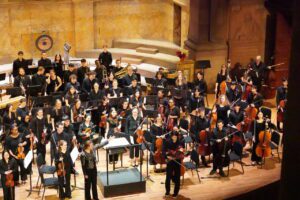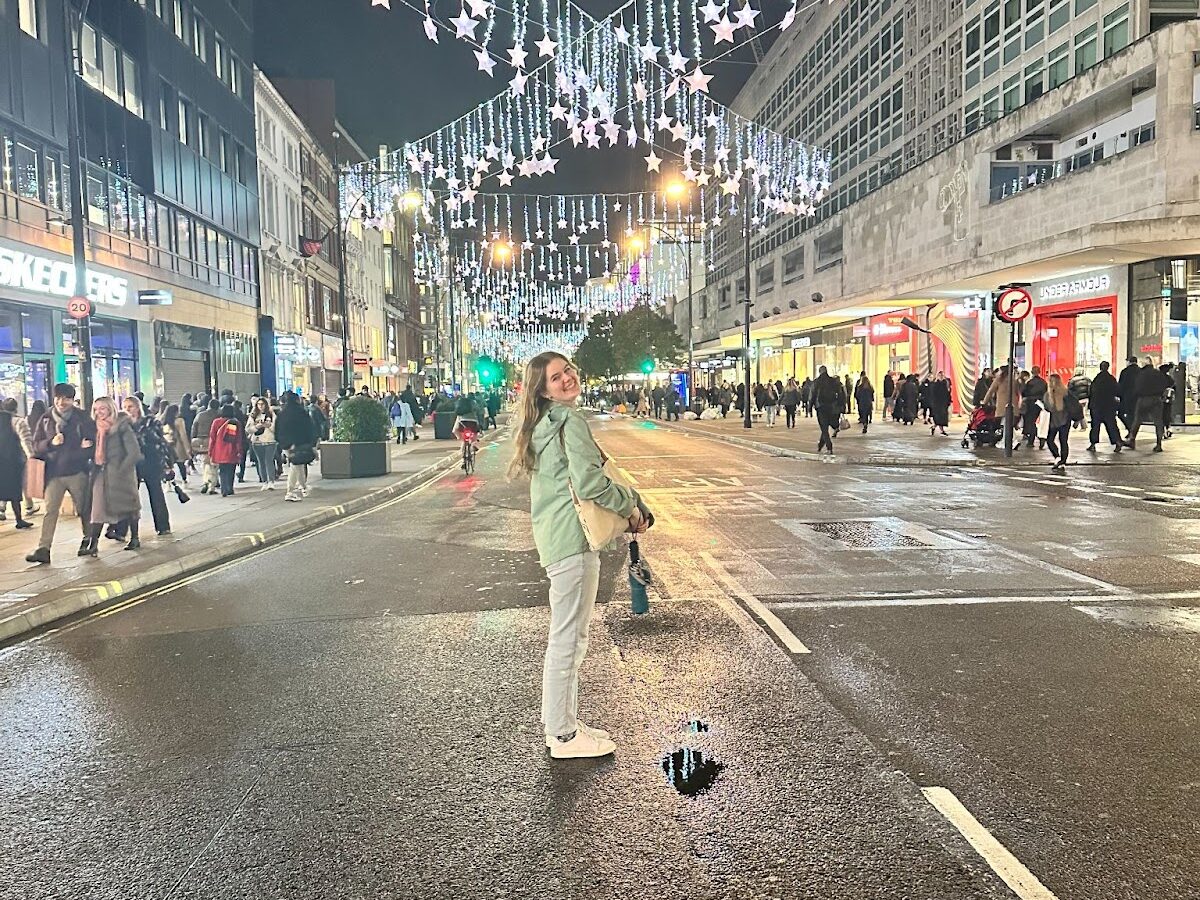
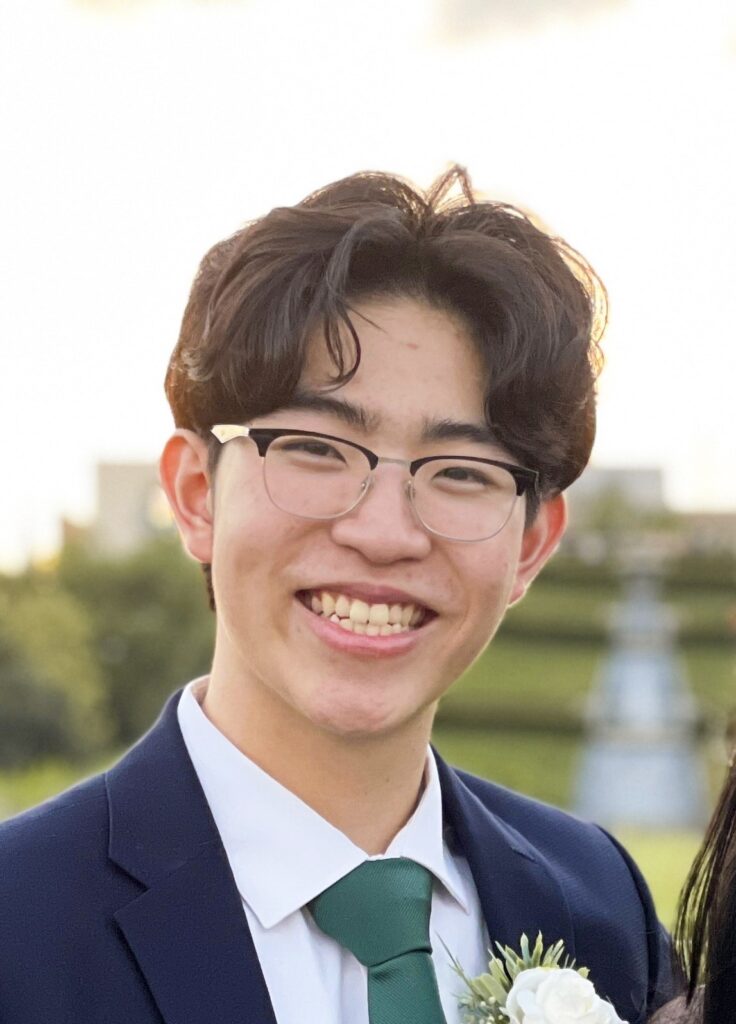

Name: Dorothy Junginger
Major: Molecular Biology
Hometown: West Des Moines, Iowa
Class Year: 2025
Musical Groups: Princeton University Orchestra (viola); Trenton Youth Orchestra (strings coach); Opus (viola)
Name: Kyle Tsai
Major: ORFE
Hometown: Houston, Texas
Class Year: 2025
Musical Groups: Princeton University Orchestra (clarinet); Trenton Youth Orchestra (woodwind coach); Opus (clarinet)
Name: Audrey Yang
Major: French
Hometown: Princeton, New Jersey
Class Year: 2025
Musical Groups: Princeton University Orchestra (flutist); Trenton Youth Orchestra (woodwind coach); Opus (flute)
Early Mornings at the Flat.
Audrey Yang: Dorothy, Kyle, and I live together in a flat in West Kensington. We know each other from Opus and PUO, so when we all got the opportunity to study abroad at the RCM, we decided to live together here. Our flat is across the street from a tube station, so after making myself a frozen breakfast burrito I head out so I can arrive bright and early at College [what students call the RCM] for my 8am flute lesson with Gitte Marcusson.
Kyle Tsai: My first class isn’t until 10am, so I have a later start. I wake up around 9-ish, spend about 15 minutes getting ready and eating a quick breakfast, and then take the tube the three stops to College. It’s probably about a twenty-minute commute total. Living in West Kensington is a lot different than living on Princeton’s campus. Here, we’re right in the middle of the city, which means it’s also really easy to get anywhere. I go to South Kensington a lot, High Street — places that remind me of New York.
Dorothy Junginger: Mondays are extra busy due to having 4 classes plus sometimes a morning lesson and rehearsals. This week my lesson is Tuesday instead of Monday, so I have some extra room in the morning. The biggest highlight of my time at RCM has been working with my viola teacher, Nathan Braude. I have thoroughly enjoyed learning from him about how to produce the best sound possible and diving into the Bartok viola concerto and Brahms E flat sonata in my lessons. This Monday was the start to my busiest week yet at RCM because of my orchestral project.
A Trip to the BBC Symphony.
AY: After my lesson, from 9-10am, I catch up on work for my first class of the week, Intro to Music Technology. Right now, we’re making a simulated transcription in Logic [a music software] of the first twenty bars of the second movement of Dvořák’s “New World” Symphony. The goal is to use different instrument sounds from MIDI libraries to make our mockup of the symphony sound as close as possible to an actual orchestra playing it. The library that we’re working with is of BBC Symphony Orchestra sounds, so it’s kind of as if the BBC Symphony were playing Dvořák’s piece from our computer. For composers, it’s always good to hear what a piece of music actually sounds like outside of your head, so this is a really useful tool. At 10am, Music Tech starts; today, we’re talking about how to balance an audio file in MIDI.
KT: I’m also in Music Tech with Audrey for my first class of the day. I’m an ORFE major, so I have a natural interest in computer-related things, and this is a good opportunity for me to sort of intersect music with computer science.
DJ: My section of Music Tech starts at 11am. We’re working on the same project right now. There’s a Boston University exchange program at the RCM too, and one of the students from that program is in my class. It’s been fun getting to know the experiences of other exchange students and becoming friends with them in addition to the RCM students who are in my class.
Listen Up, A.K.A. Aural Skills.
AY: At 11am, I have my Aural Skills class. I’m a French major back on campus and I realized that I haven’t seriously studied music theory or aural skills before. Being able to have dedicated space to do so is super cool, and I know that it will help me look at the music I play in a different way.
KT: Right now in Aural Skills, we’re practicing dictation: we’re working on identifying a note within a chord when it’s played and being able to write it down on manuscript paper. We’ve also been practicing recognizing differences between written music and what we hear.
DJ: Our background at Princeton is mainly music theory; we do have an ear training precept, but it’s not the main focus. I didn’t think I would like Aural Skills because it seemed intimidating, but it’s actually my favorite class. Today, we’re singing a lot of major and minor seconds and doing some atonal dictation practice. As Princeton students, we have to take the final end-of-year theory exam a term early, which means ours is around the end of November instead of in April or May. It’s a bit of a challenge cramming in a lot of skills in a shorter period of time, but our instructor makes the topic really approachable.
Archival Treasures.
AY: Next up is my Historical Studies of Orchestra class. We’re learning about the history of the orchestra and the composers who influenced the development of the symphony. This class, we talked about women and other underrepresented composers, like Florence Price and Samuel Coleridge-Taylor.
KT: I have my Historical Studies of Orchestra class after Audrey, but we’re working on the same topic. We’ve looked at Beethoven, Schubert, and Wagner, but looking at music by Coleridge-Taylor is really cool: he went to the RCM, so the library has the original manuscript of his Symphonic Variations on an African Air. We’re looking at that and talking about the impact Coleridge-Taylor made on music. The library here is amazing. In high school, I used to get my scores on IMSLP, but the RCM library has really great editions of musical scores — and just so many of them!
AY: The archival documents that the library has are super interesting. In class, we also looked at the original sign-up lists of women who joined the Society of Women Musicians in London. We don’t have as much documentation from the past about many women in classical music, so it’s really cool to think about how we figure out who was where when and what they did.
DJ: In that class, we also recently spent some time reading through parts of Berlioz’s Treatise on Instrumentation; he had a lot of good things to say about the viola, so, as a violist, I especially appreciated that.
What’s in a Name?
KT: I have another Historical Studies class before Orchestra: Historical Studies of Musical Genres. We’re talking about what makes a certain piece of music a certain genre or form — so, what makes an opera and opera, for example — and we’re also looking at pieces that pushed the boundaries of those genres or forms. Our most recent topic was the sonata.
DJ: Learning about different genres is really helpful to my own playing. Learning about the sonata, I could apply what I learned to the viola sonatas I’m working on. I analyzed one of my favorite sonatas, the Rebecca Clarke Viola Sonata, through the lens of the genre as part of my homework.
AY: Today, we’re also looking at musical arrangements as reworkings of musical compositions. We’re talking about paraphrases, variations, that kind of stuff.
Switching Gears.
AY: At 2pm, I get lunch at The Sandwich Shop, which is a few blocks away from the RCM. I do some stuff on my computer and then head to the gym to get a workout in at 3pm. My gym is in Imperial College, which is right next to the RCM, so it’s super convenient. Running on the treadmill, I’m thinking a lot about the Alexander Technique [a body awareness technique]. The Princeton students at the RCM take mostly the same classes, but on Thursdays, I have an Alexander Technique class while Kyle and Dorothy are in their Music Leadership class. The RCM has a long history of teaching the Alexander Technique, which is just not as easy to get exposure to in the US and at Princeton. Increasing that general awareness of yourself and learning how to move and carry your body in a balanced way, not just in practice, but even at the gym or while just walking around, is really beneficial.
KT: Mondays are really busy, so typically I head home following my four hours of class. I make myself lunch, take time to relax, and then usually practice in our flat. Right now, I’m working on the Spohr Clarinet Concerto No. 1. I’m also always working on the Mozart Clarinet Concerto. For the Spohr, I’m focusing on the second half of the third movement, which is pretty technically challenging. I just started learning it this term so there are still a lot of things that I want to work out: jumps that I want to make smoother, articulations I want to practice. For the Mozart, I’m working on making the musical ideas on the first page of the exposition come to life, which is something I was discussing with my teacher, Timothy Lines, in my last lesson. At the time when Mozart composed the piece, the clarinet was a new instrument on the block, and things that now seem very standard, like a two-octave arpeggio, back then were very revolutionary. And so the way that I play it should feel like something that is very new and shocking. He said a quote he likes is: every piece of music at one point was modern music. And I think that was definitely a good summary that I keep in mind during my practice. Sometimes when we’re so busy on campus, the easiest thing to slack off on is practice. But here, having the opportunity to really focus on practicing, I think will help me carve out more time for it when I get back to Princeton.
DJ: This week is the busiest week of my time at the RCM because I have my orchestra project. When we got here in September, we auditioned for projects that would take place in the second half of the term. We all started out singing in the choir for the first RCM concert — though I actually got to play in the orchestra for that concert because someone dropped and they needed a replacement. (We played Lili Boulanger’s Du fond de l’abîme, which was a really cool experience to play in the orchestra with a massive choir behind us and an alto soloist too.) Now that we’re in the second half of the term, my orchestra project is Prokofiev’s Symphony No. 5, Beethoven’s Egmont Overture, and the U.K. premiere of Gubaidulina’s The Wrath of God. We’re being conducted by Vasily Petrenko in the performance, though he doesn’t come until later on in the project. Today I have five hours of rehearsal, from 3-5:30pm and 6:30-9pm. Tomorrow, I have a viola sectional and Wednesday through Saturday we have more rehearsals, followed by the concert on Sunday. I’m also in another orchestra that my friend invited me to play in; that’s running later in November. We’ll be playing Stravinsky’s Firebird.
Practice, Practice, Practice.
AY: Before I head to my practice room at 4pm, I peek into Dorothy’s orchestra rehearsal and take a video for Instagram. I’m filming clips of my Day in the Life for the Princeton Music Department today. Check it out on the Music Department’s Instagram! In my practice room, which I have from 4-6pm, I’m practicing long tones. The goal is to better my tone and embouchure, or the way you form your lips when you’re playing to achieve different qualities of sound. I’ve been working with my teacher on gaining more flexibility in the embouchure such that I can get different sounds out of the flute rather than keeping one default quality. I’m also thinking about Alexander Technique as I practice. I slow down and zoom in on how I might be tensing up both within the embouchure area or in my whole body and how that might be affecting my playing. I then practice Messiaen’s Le Merle noir and try to get the birdsong sounds both technically correct and more natural. Messiaen was an ornithologist on the side — actually, I don’t know if he was an ornithologist on the side or a composer on the side! I need to practice keeping an internal pulse because the piece doesn’t really have a time signature. Finally, I take a few minutes to sit at the upright piano and familiarize myself with the cadences that I need to know for my Aural Skills test. I play flute as my main instrument, so I’m not in the space where I’m always thinking about chords; it’s more of a challenge for me.
Chamber Rehearsals & Vlogging.
KT: Sometimes, I have rehearsal back at College, around, say, 6pm, with Audrey and a pianist we met here called Sabrina. We’re doing Saint-Saëns’s Tarantelle, so we’ve been finishing the first half and starting to look at the second half, specifically looking at tempo changes and where we’ll need to really line up with each other. But today, since we don’t have rehearsal, I stay at home and take time to edit my upcoming video for YouTube. I make a lot of content around what it’s like to be a Princeton student; now, coming to London, I’m making videos about my experience here.
AY: Dorothy and I are also in a chamber group with a really lovely harpist, and we’re playing Debussy’s Sonata for Flute, Viola, and Harp.
DJ: I’m also in another trio with violin, viola, and cello that I sometimes have rehearsals for, as well as a viola duet with one of my friends.
AY: We’ll also sometimes have a Rep Session. I was supposed to have a Rep Session today on Tchaikovsky’s Symphony No. 1 too, which is when a faculty coach runs a woodwind sectional, except there’s no performance; in Rep Sessions, we run through the piece to both familiarize ourselves with the repertoire and to help us play better as a section. But that got canceled today.
Dinner.
KT: At 6pm, Audrey and I make dinner at home. I’m making a Korean potato-carrot dish, and Audrey’s making pesto salmon with tomatoes. We split it up and talk about our classes and upcoming orchestra rehearsals. We both start our orchestra project next week, even though Dorothy has hers this week. We talk about the pieces we’re going to play and whether we’ve started looking at them. We also often talk about what’s happening at Princeton. It’s nice to feel connected to the campus.
AY: We’ll often talk about London too and how we spent our weekend. I really like to wander around London solo. I recently went to a pottery shop in South London recently where they had these really neat swirly plates and a gorgeous view of the sunset through the window through the bowls. The V&A [Victoria and Albert Museum] is beautiful. I ended my Instagram video filming before dinner, but after dinner, I spend more time on my Music Technology project. I’m the kind of person who will start working on something and then keep returning to the same thing until I’m done with it. So I’m using all of my downtime today to work on that.
DJ: In between rehearsals, I get dinner at this cute little Japanese cafe called Tombo nearby in South Kensington. I also sometimes grab a quick Tesla meal deal and eat with friends from rehearsal. Then, I head back to College for round two.
Winding down.
DJ: Once I’m finally home at the end of a long day, I make a little snack and work briefly on some homework before getting ready for bed. I might also plan some fun things to do in London for tomorrow, like grab a hot chocolate from Knoops, head to an art museum like the Tate, or, as the holidays approach, see some pretty light displays. I listen to some Laufey, the Icelandic artist, a little bit of Prokofiev 5 to get it in my head for rehearsals, and then go to bed.
KT: To wind down, I take a shower and watch some Netflix and YouTube videos before falling asleep.
AY: Morning here isn’t a good time to text anyone in the Eastern time zone, so at night it’s a better time for me to keep in touch with friends. I text a few friends before falling asleep. It was a full day!
Follow @musicprincetonu on Instagram to see Audrey’s ‘Day in the Life’!
In Other News
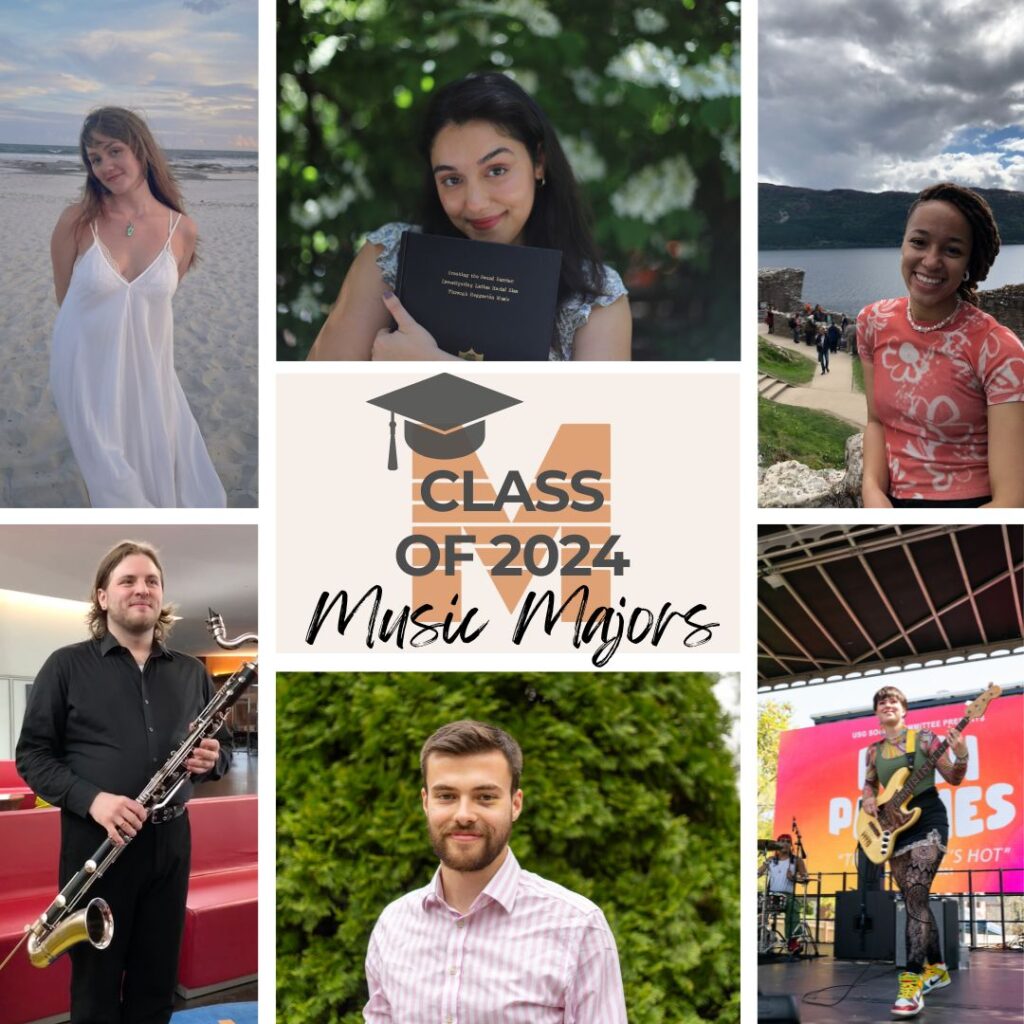
What Six Senior Music Majors’ Say About Their Theses
May 16, 2024
As we near the final weeks of spring semester and anticipated graduation for the Class of 2024, the Music Department asked six Senior Music Majors to expand on their creative thesis, as well as share words of encouragement to future students.
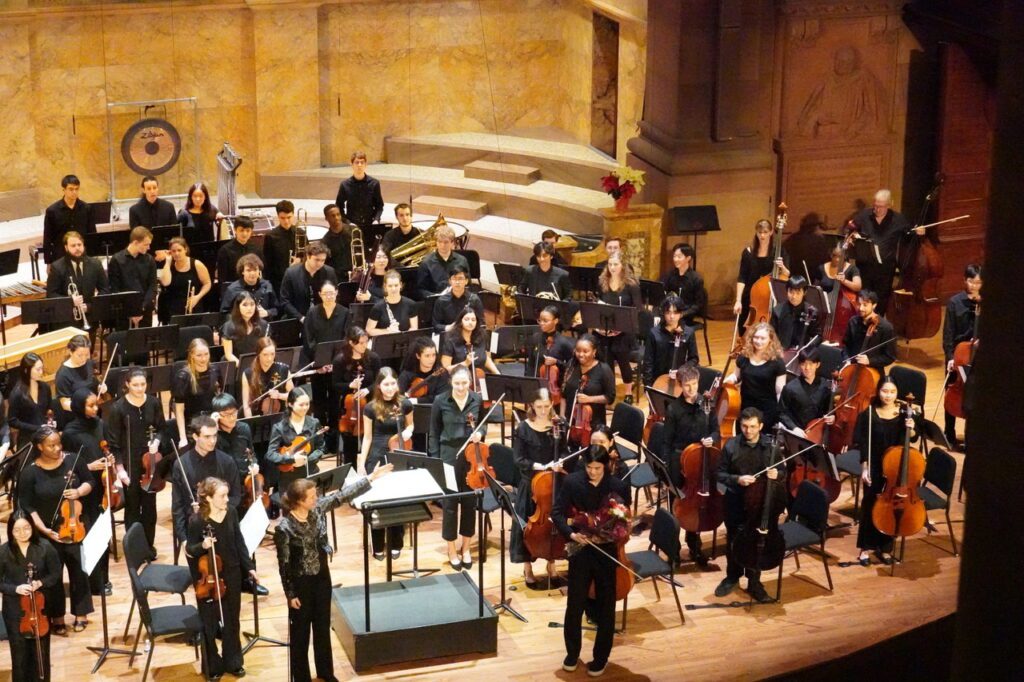
Student Perspectives: The Musical Odyssey of Princeton’s Adrian Thananopavarn
Jan 18, 2024
Adrian P. Thananopavarn ’24, Math major with certificates in Computer Science and Music Composition, premieres “March of Dusk” with Princeton University Sinfonia
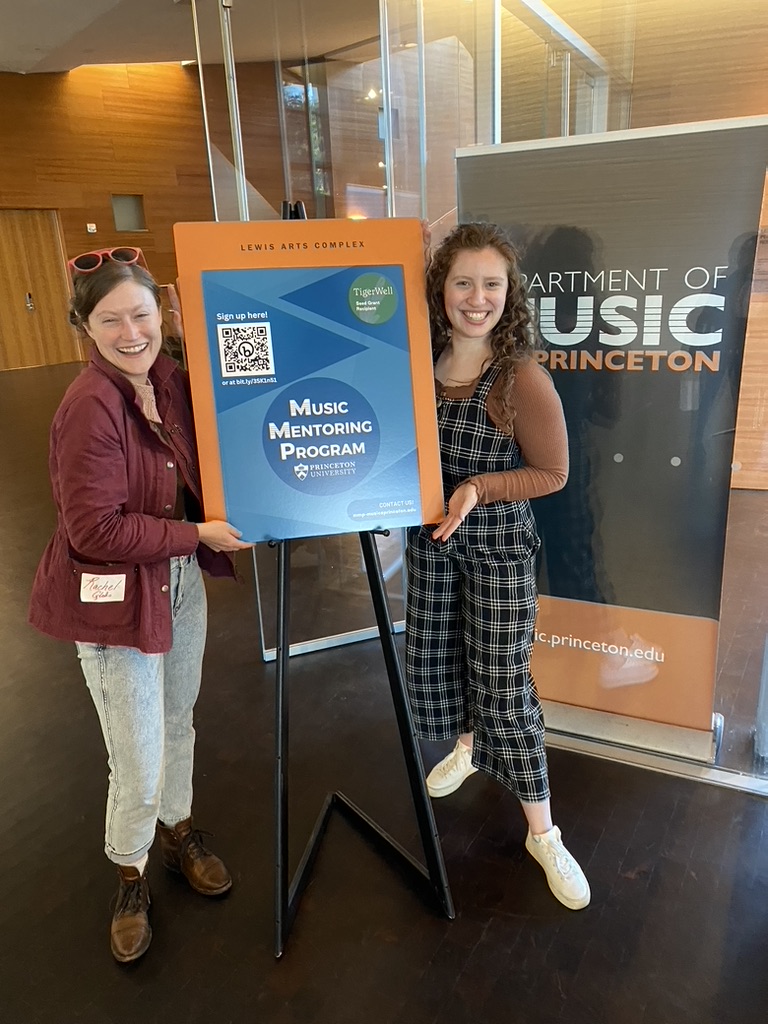
Get to Know the Music Mentoring Program
Sep 13, 2023
Learn about the Music Mentoring Program and join their welcome event on September 14 from 5:30PM-7:30PM in the Woolworth lobby


